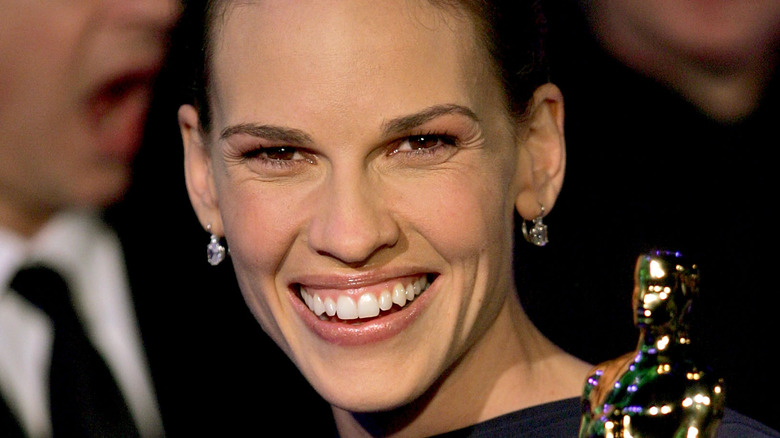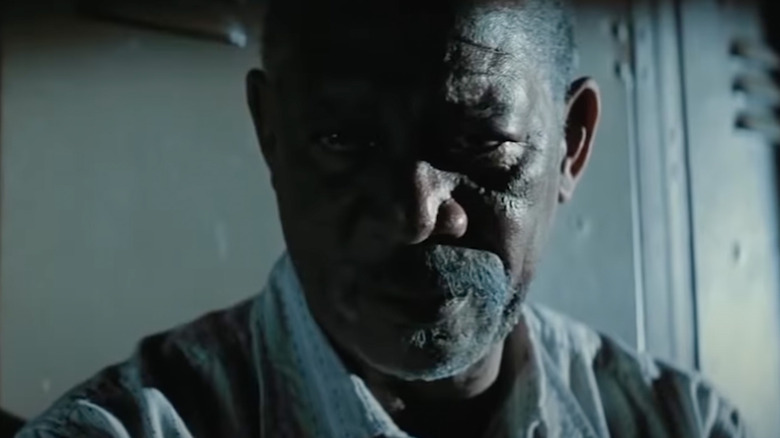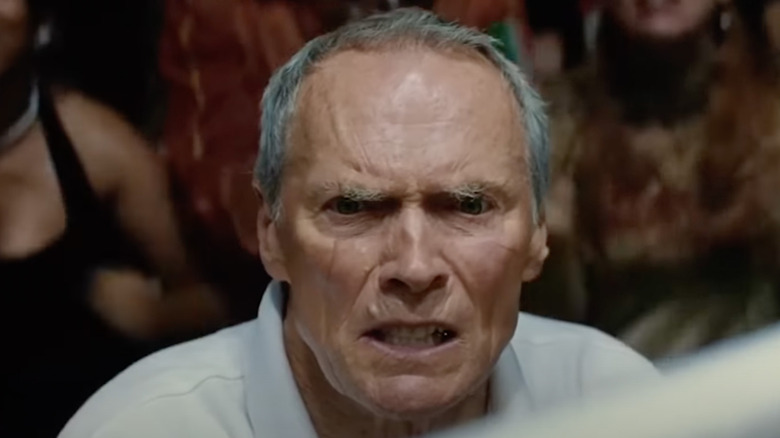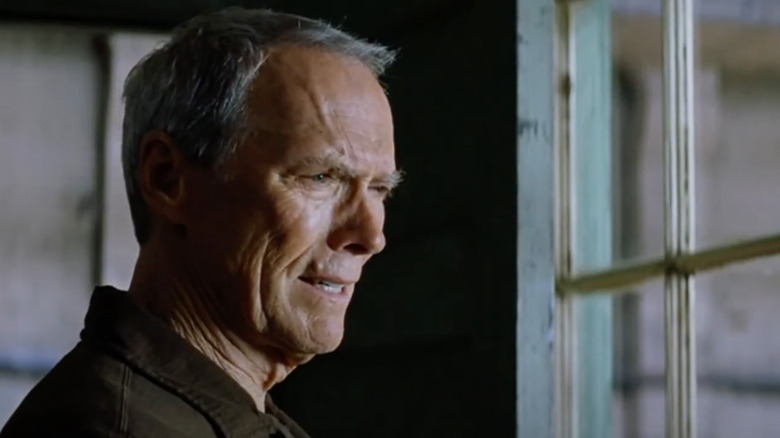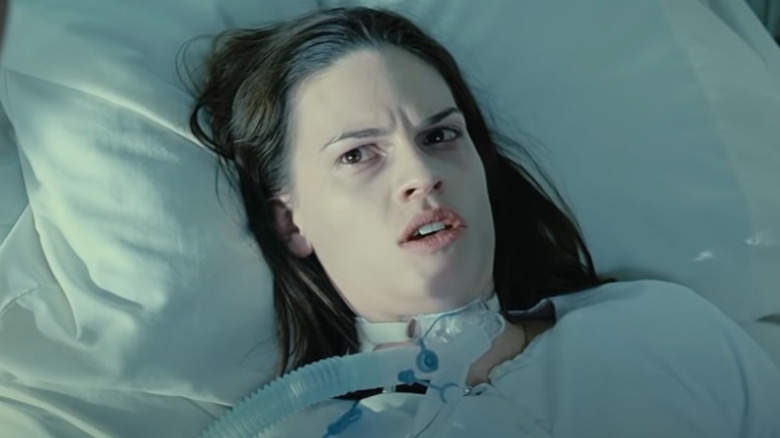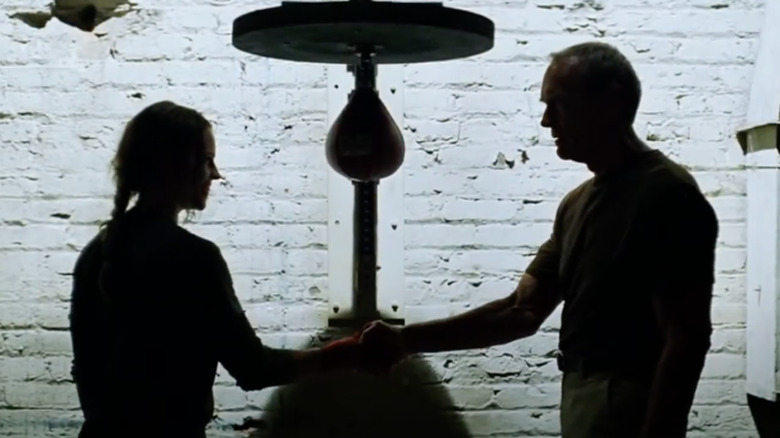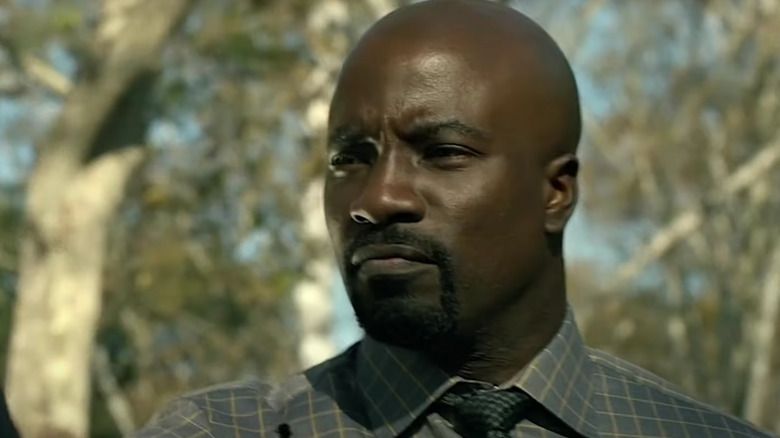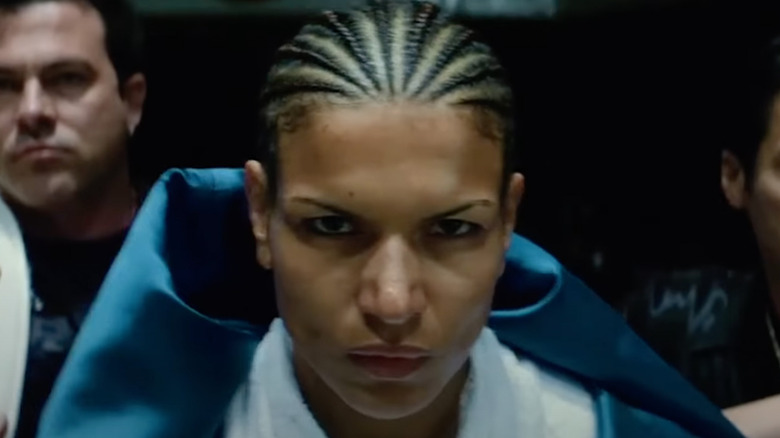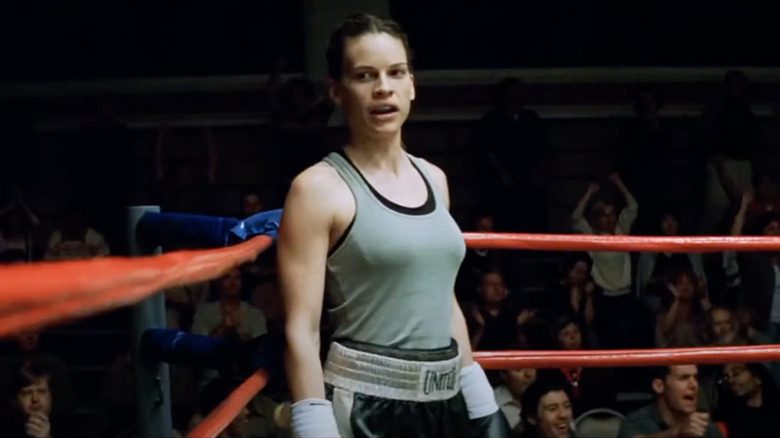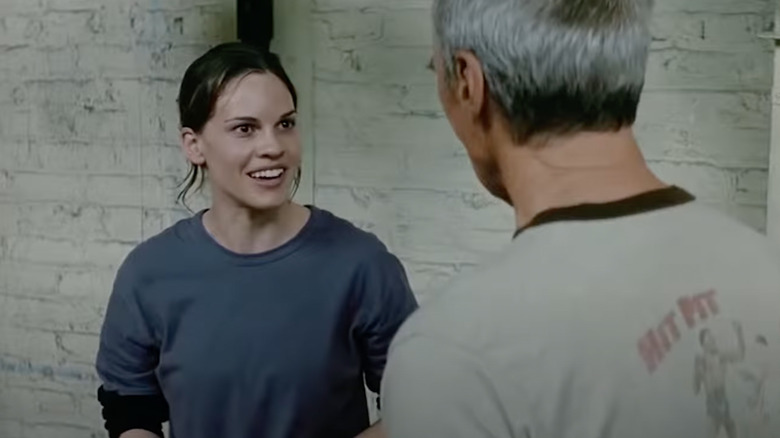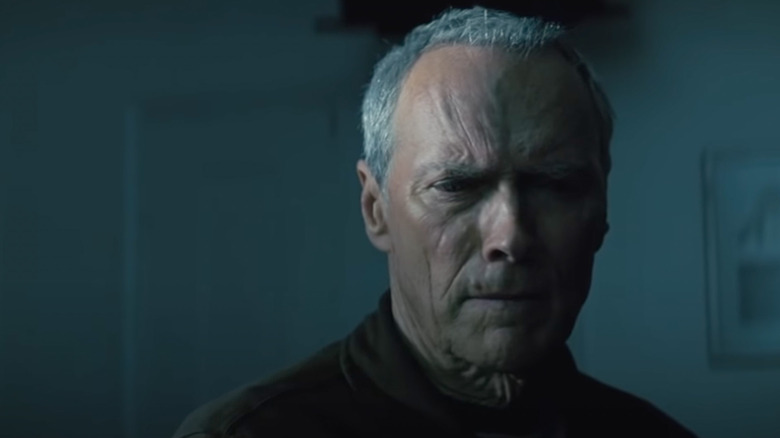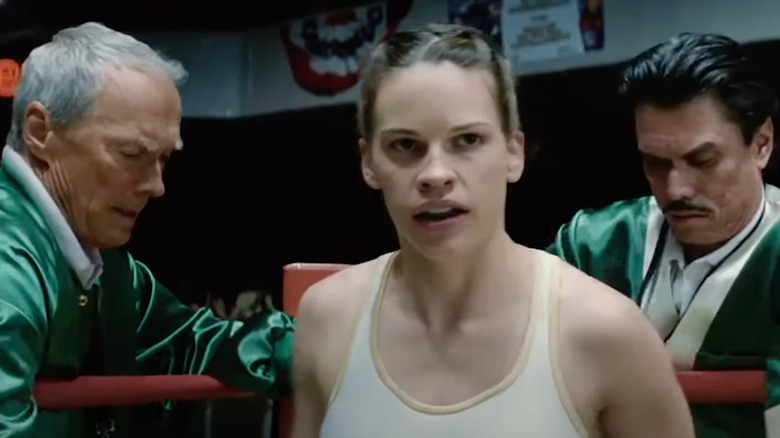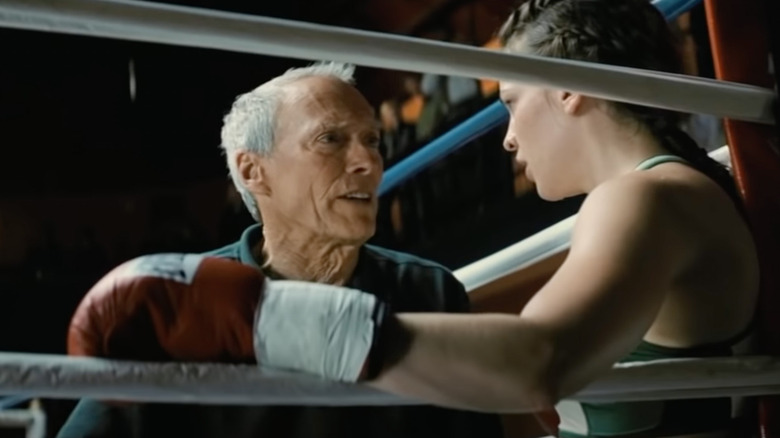Take To The Ring With These Million Dollar Baby Facts
Clint Eastwood's "Million Dollar Baby" was released on December 15, 2004 to stunning critical and commercial success, earning $231 million at the worldwide box office and ultimately taking home Oscars for Best Picture, Best Director (Clint Eastwood), Best Actress (Hilary Swank), and Best Supporting Actor (Morgan Freeman). To this day, it ranks among Clint Eastwood's best films and remains one of the better crowd-pleasing sports dramas ever produced.
For those who have yet to partake in this masterpiece, "Million Dollar Baby" tells the story of a downtrodden young woman named Maggie (Swank) who attempts to turn her life around by becoming a boxer under the direction of grizzled old trainer Frankie Dunn (Eastwood). Together, the pair and equally gray former boxer-turned-janitor Scrap (Freeman) achieve extraordinary success, form an unlikely bond, and help each other mend deep wounds inflicted by past mistakes.
Everything from the performances, Paul Haggis' script, and Eastwood's assured direction is top-notch, making "Million Dollar Baby" an extraordinary achievement in motion picture history. While the overall production was relatively straightforward, there are still plenty of fun facts fans of the movie may be surprised to discover. As such, we have compiled a list of facts only huge fans know about "Million Dollar Baby." Let's do this!
Morgan Freeman finally won his only Oscar
Morgan Freeman remains one of our greatest actors. The man has starred in acclaimed dramas such as "Glory," "Driving Miss Daisy," "The Shawshank Redemption," and Christopher Nolan's "Dark Knight" trilogy. Yet, for all of his astounding success, Freeman's astonishing performances are consistently overlooked by the Academy of Arts and Sciences.
Indeed, despite earning a respectable five nominations throughout his storied career — including 1984's "Street Smart," 1990's "Driving Miss Daisy," 1995's "The Shawshank Redemption," and 2010's Clint Eastwood-helmed "Invictus" — Freeman didn't take home the statue until "Million Dollar Baby." His win for Best Supporting Actor felt like long-overdue recognition for the superstar, even if he had to beat fellow nominees Jamie Foxx ("Collateral"), Alan Alda ("The Aviator"), and Thomas Hayden Church ("Sideways") to claim his coveted prize.
Freeman is genuinely magnificent in "Million Dollar Baby," delivering a steady performance that reflects the personal anguish and disappointments Eddie "Scrap-Iron" Dupris has faced throughout his lifetime. His scenes with Frankie are peppered with light-hearted humor but also coated in a cloud of regret, primarily due to an incident that ended Scrap's boxing career and rendered him blind in one eye. It's an incredible performance that ranks among Freeman's finest. Too bad it took so long for Oscar to recognize his talent.
Eastwood earned his second nomination for Best Actor
Speaking of astounding performances, Clint Eastwood earned a well-deserved Academy Award nomination for his lead performance as Frankie — but lost to Jamie Foxx for his incredible turn in the Ray Charles biopic "Ray." Surprisingly, despite over 70 credits to his name, this marked only the second time Eastwood earned a nomination for his acting. Previously, he was recognized for "Unforgiven" in 1993 but lost to Al Pacino ("Scent of a Woman").
It's crazy to think Eastwood only earned two nominations for his work, despite appearing in classic films such as "The Good, the Bad and the Ugly," "Dirty Harry," and "High Plains Drifter." One could argue Eastwood basically plays Eastwood in all of his films, which is why the Academy turned up their noses at previous performances and explains why they finally nominated his efforts in "Million Dollar Baby" — it's the least Eastwood-y role of his legendary career. Here, the man displays a softer, more vulnerable side — he even cries! While "Unforgiven" remains Eastwood's de facto masterpiece — a powerful summation of his western career — "Million Dollar Baby" marks as his strongest turn as an actor.
Clint Eastwood composed the score
One of the aspects of "Million Dollar Baby" that makes the picture tug at the heartstrings is the simplistic guitar riff that plays sparingly over the soundtrack, often during the more dramatic moments, as a means to underline the pathos. Did you know that said score was composed by Clint Eastwood himself? This trait from the maestro is nothing new as the acclaimed filmmaker has tackled scores in a handful of his films, including "Mystic River," "Flags of Our Fathers," and "Hereafter," often with equally simplistic, albeit powerful, results.
Like "Unforgiven" and "Mystic River" before it, "Million Dollar Baby" opens with its simple theme played over the Warner Bros. logo. We hear the music sparingly throughout the remaining picture, but the small orchestral score combined with Eastwood's imagery creates a somber, even haunting atmosphere. The best example of this is the scene where Maggie smiles at a young girl while parked at a gas station with Frankie. We see the pain on Maggie's face as she reflects on the life she wishes she had while a simple piano melody plays over the soundtrack. Simple but effective filmmaking at its finest.
Disabled people protested the film
Almost everyone loved "Million Dollar Baby" after its release. Well, almost everyone. While critics and general audiences praised the film for its powerful drama and surprising ending, a group known as Not Dead Yet, consisting of disabled people, felt the picture was decidedly anti-disability.
For those unaware, the turning point in "Million Dollar Baby" arrives when Maggie falls and breaks her neck during a boxing match. The accident renders her quadriplegic, leading the young fighter to eventually seek death rather than continue living in her current state. Frankie obliges and delivers a shot of adrenaline, allowing Maggie to slip away peacefully.
Not Yet Dead gathered at Berkeley, California, to protest the film during its release, according to the Chicago Tribune, claiming it urged people with quadriplegia to seek euthanasia, a notion echoed by the National Spinal Cord Injury Association. The Tribune notes that Eastwood had once spoken out against the Americans with Disabilities Act after his Mission Ranch Inn in Carmel, California, came under attack by a disabled individual who felt various aspects of the locale were inaccessible — a battle the actor/director eventually won.
Does Eastwood's ideology cloud "Million Dollar Baby"? That is up to the viewer to decide, but the outrage among disabled individuals is certainly worth noting.
The film was partially inspired by a true story
Paul Haggis' "Million Dollar Baby" screenplay is based on a pair of stories featured in "Rope Burns: Stories from the Corner," written by Jerry Boyd under the pseudonym F.X. Toole in 2000. Boyd, in turn, may have been inspired by boxer Katie Dallam's tragic real-life story, according to an article on NBC News.
Per the report, in 1996, Katie, then 37 years old, decided to take up boxing after viewing a female boxer on the cover of Sports Illustrated. She sought a trainer and leaped into the ring after six weeks of training. There, she squared off with 24-year-old Sumya Anani, an intense fighter who would eventually become world champion in three weight classes. Predictably, the fight was one-sided. Sumya delivered a flurry of punches to Katie's head, impacts that eventually led her to pass out in the locker room after the fight. Katie was rushed to the hospital, spent a week in intensive care, and lost half of her brain.
Miraculously, she survived and, following a period of depression, eventually took up art, which serves as her emotional outlet. "With the art, I think it's the only place I feel real, I guess, is the word I'm looking for," Katie told NBC. "I feel like myself when I'm doing my art work. In any other setting I feel sort of not here kind of. If that makes any sense."
Luke Cage makes an appearance
Early in "Million Dollar Baby," we see Frankie attending a boxing match featuring one of his prized pupils, Big Willie Little. We later learn the pair have worked together for quite some time, and while Willie has ascended the boxing ranks thanks to Frankie's training, the young star has yet to take a title shot. Frankie held Willie back, afraid he would get hurt or fall short of expectations. As such, Willie takes his talents to another manager and quickly becomes the world champion, paving the way for Frankie to take Maggie on as a new trainee.
Willie never returns in the film, but the actor portraying the character has popped up in several notable ventures — including the Netflix Marvel spectacle "Luke Cage." That's right! Mike Colter, aka Luke Cage, portrays Big Willie Little in "Million Dollar Baby," a bite-sized role that grew into other incredible opportunities. He might even return for more comic book action as Cage should the stars align at Disney/Marvel studios.
Big Willie Little was only Colter's third screen appearance following one-episode stints on "ER" and "The Parkers." After "Million Dollar Baby," the actor expanded his resume with a handful of roles on the small screen before landing gigs in films such as "Salt" and "Men in Black 3," as well as recurring work on the TV series "Ringer." He has since remained incredibly busy with the likes of TV's "Evil" and smaller pictures "Fatale" and "I'm Charlie Walker."
Lucia Rijker is an actual fighter
As mentioned above, the turning point in "Million Dollar Baby" involves our hero, Maggie, breaking her neck during a middleweight championship fight against an aggressive Dutch fighter known as Billie "The Blue Bear" Osterman. As it turns out, the actor portraying the character, Lucia Rijker, is a professional fighter dubbed "The Most Dangerous Woman in the World" by some media outlets. Hence, the reason the Blue Bear sent shivers down our spine when she first appeared on the screen.
Rijker, who also enjoys the monikers "Queen of Lightening" and "Lady Ali," is a four-time World Champion Kickboxer who knocked out 25 of 36 opponents in the first round. The native of Amsterdam earned an incredible 36-0 record throughout her career.
After defeating Diane Dutra in Las Vegas in 1999, Rijker took a break from fighting to pursue acting in Hollywood. She appeared in films such as "Rollerball," "Million Dollar Baby," and J.J. Abrams' "Star Trek," and TV shows such as "JAG" and "The L Word." Rijker returned to boxing in 2002, defeated Jane Couch, and then beat Sunshine Fettkether in 2004. A torn Achilles in 2005 halted future fights, and Rijker has remained out of the ring ever since.
The title connects to a Henry Warren song
The title "Million Dollar Baby" comes jam-packed with plenty of meanings. On the one hand, it represents Maggie's ascension to superstardom — she literally and figuratively becomes Frankie's million-dollar baby after securing the $1 million bout with Bille "The Blue Bear" Osterman. On the other hand, the title might derive from the 1931 Henry Warren tune of the same name that features the lyrics "I found a million dollar baby in a five and ten-cent store." Frankie basically plucks Maggie — a poor girl with lofty ambitions — from his decaying gym and transforms her into a treasure, a plot point that echoes the song.
If you want to go even further down the rabbit hole, at least as the film's title pertains to boxing, Sonny Liston once called the great Muhammad Ali his "million dollar baby" before their 1964 fight. Ali entered the bout as the underdog, and Liston expected upwards of $1.1 million in revenue from the event (he received $367,000), hence the insult. Naturally, the 22-year-old Ali (then going by the name Cassius Clay) won the bout and was declared heavyweight champ of the world. Hey, that sounds familiar!
Hilary Swank developed a serious staph infection
Hilary Swank earned an Oscar for her incredible performance in "Million Dollar Baby," which required an intense training regime for her to pull off. While her dedication impressed trainers, Swank's efforts also led to a grueling infection that could have proved fatal.
"I was about halfway through my training when I got a blister...the size of my palm on the ball of my foot," the actor told Mike Wallace on "60 Minutes." And it was my front foot, the one I have to pivot on. ...So, I popped it. ...I popped it myself. I didn't let it pop on its own, whatever. I popped it on its own. And I did it in the bathtub." The wound was quickly infected with staph bacteria and became painful enough for Swank to rush to the hospital.
"I couldn't believe the pain," she said. "It was — unbelievable. And I looked down...there were streaks going up my foot. So, I went to the doctor that second. And he looked at me, and he said, 'This is really serious. And if you would have waited two more hours, you would have been in the hospital for three weeks.' And if it gets to your heart, that's it."
Luckily, Swank's doctor caught it in time and allowed the actor to continue training/filming. In fact, she kept the infection a secret from Eastwood and her trainers "because, in the end, that's what happens to boxers."
Eastwood shot the film in 37 days
"Million Dollar Baby" enjoyed a relatively smooth production — once it finally received the green light, that is. As Eastwood recalled during an interview with Charlie Rose, a company called Lakeshore Entertainment had financed the script writing for the film but were only able to pay for half the production cost. Eastwood took the script to Warner Bros. and asked them to participate. "They had looked at the script, but they weren't nuts about it," he said. "They were a little afraid of it." Eventually, the iconic actor/director convinced the studio to fork over half of the production cost and then set out to make the picture.
Shockingly, for a film jam-packed with star power and some fairly complicated boxing sequences, Eastwood was able to wrap production in just over a month — 37 days to be exact. Considering "Million Dollar Baby" went on to garner a number of Academy Awards and over $216 million at the worldwide box office, it's probably fair to say everyone involved went home very happy.
Hilary Swank ate a lot of eggs
Hilary Swank had the most challenging role in "Million Dollar Baby," both on and off camera. In the film, she had to convey Maggie's emotional journey from underdog-turned-superstar to a physically broken young woman beset with a horrible tragedy. Swank also had to get in good shape to look like a professional boxer off-screen. As Clint Eastwood explained in his interview with Charlie Rose, "We needed to really bulk her up."
The actor/director explained Swank's grueling training regime, which required her to add a whopping 20 pounds of muscle and learn to box within three months. Swank, a former swimmer, and gymnast, found the preparation for "Million Dollar Baby" overwhelming. Not just the physical aspect, mind you, but the extreme diet.
"I started working out five hours a day — I had to eat 210 grams of protein a day," she told The Hollywood Reporter. "I don't know if you guys are aware of intake of protein. ... I had to eat 60 egg whites in a day and I couldn't. So every morning I would drink them. I had to eat every hour and a half. So in the night, I had to wake up and drink protein shakes. I put on 23 pounds of muscle."
The script didn't change during production
Finally, in an interview with Entertainment Weekly Radio, Hilary Swank discussed the one aspect of "Million Dollar Baby" that drew her to the story: Paul Haggis' screenplay, which, according to the actor, did not change at all during production. Certain moments in the film are improvised, such as when Maggie leaps onto Frankie following news of her upcoming title bout, after which Frankie tells her to "Get the hell off of me, do you know how old I am?" Otherwise, everyone stuck to the words on the page.
"I don't know if I'll ever find a more perfect script," Swank said in an interview with Entertainment Weekly Radio. "From the moment I read the script to what you see on screen, not one word changed. It's all there — not one, little tiny word. It was perfect as it was."
Eastwood echoed her sentiments in a roundtable interview with James Lipton, Swank, and Morgan Freeman. "I told [Haggis] I liked the screenplay," Eastwood said, "and he asked, 'Well, what do you want to do? Do you want to do a rewrite?' I said, 'You know, I don't think I want to do a rewrite.'" The iconic actor/director later admitted he allows his actors plenty of freedom to explore their characters throughout the filmmaking process. "I shoot much more improvisational than a lot of people think."
